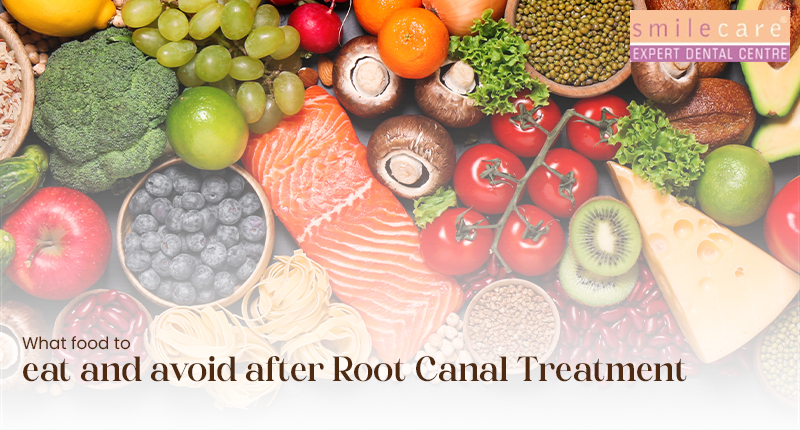A root canal can bring immense relief, freeing you from persistent dental pain. But the healing process doesn’t end when you leave the dentist’s chair. Eating the right foods and steering clear of harmful ones can make a significant difference in your comfort, recovery time, and long-term tooth health.
1. Why Diet Matters After a Root Canal
After treatment, the affected tooth is fragile, especially if you’re waiting on a permanent crown or filling. Dentists generally recommend sticking to soft foods and avoiding meals until the numbness fully wears off. This prevents accidental biting injuries and helps protect the treated area.
There are two main risks during recovery:
- Damaging temporary restorations or irritating sensitive tissues.
- Slowing healing by exposing the area to stress or bacteria.
Making smart food choices supports a smoother, faster recovery.
2. Best Foods to Eat After Root Canal
Stick with gentle, nutrient-rich options that minimize chewing and temperature sensitivity:
Soft and Easy-to-Chew Basics
- Mashed potatoes, pureed soups, and soft-cooked vegetables like squash or carrots.
- Smoothies (without seeds or crunchy add-ons): easy on your mouth and versatile.
- Scrambled eggs, soft tofu, cottage cheese, or hummus, tender, protein-rich choices.
Fruits and Dairy
- Applesauce, ripe bananas, mangoes, pears, peaches,naturally soft and sweet.
- Yogurt and soft cheeses, soothing, cooling, and easy to eat.
Grains and Light Carbs
- Oatmeal, polenta, cream of wheat, soft pasta, or quinoa filling yet gentle.
- Soft bread and mashed sweet potatoes, smart carbs that won’t stress your tooth.
3. Foods to Avoid After Root Canal
There are several categories of food that can hinder healing or damage your temporary dental work:
Hard, Crunchy, or Chewy
- Nuts, hard candies, ice, crusty bread, raw carrots, these can crack crowns or irritate tissue.
- Sticky items like caramel, taffy, dried fruit, or gum, they may dislodge fillings.
Extreme Temperatures
- Very hot or cold foods and beverages can trigger sensitivity or pain.
- Allow food to reach a warm or room temperature first.
Spicy, Acidic, Sugary, or Alcoholic
- Spicy dishes may inflame tender tissue.
- Citrus fruit, tomatoes, or vinegar-based foods can sting.
- Sugary sweets and sodas promote bacteria growth, slowing recovery.
- Alcohol dries the mouth and may interfere with medications.
4. How to Gradually Return to Normal Eating
Healing takes time, so reintroduce foods carefully:
| Timeline | Recommendations |
| Days 1–2 | Stick to soft, mild-temperature foods. Chew on the opposite side. |
| Days 3–4 | Add slightly firmer foods like soft rice, tender chicken, or casseroles. |
| After Crown | Once fully restored, you can slowly reintroduce regular foods, watch for discomfort. |
5. Additional Recovery Tips
- Follow your dentist’s instructions closely, including medications and follow-up visits.
- Wait until numbness fades before eating, to avoid biting your cheek or tongue.
- Brush gently near the treated tooth, and use a mild saltwater rinse if recommended.
- Watch for warning signs, persistent severe pain, swelling, or fever require immediate dental attention.
Summary: Eat, Avoid, and Recover Right
- Eat: Soft, lukewarm, nutrient-dense foods, like eggs, yogurt, mashed veggies, soups, ripe fruit, oatmeal.
- Avoid: Hard, crunchy, sticky, spicy, acidic, extremely hot/cold, sugary, or alcoholic items.
- Transition carefully back to normal eating once your permanent crown is in place.
FAQs
1. Can I drink smoothies after a root canal?
Yes: just skip the straw and crunchy toppings. Cool, soft, and nutritious.
2. When can I chew on the treated tooth again?
Wait until it’s no longer sensitive and preferably until your permanent crown is placed.
3. Is it okay to eat warm soup after a root canal treatment?
Yes: as long as it’s not hot. Let it cool to a soothing temperature.
4. Why is alcohol discouraged after treatment?
It dries out tissues, interferes with healing, and may interact with pain medication.
5. What if my treated tooth still hurts after a week?
Contact your dentist. Persistent pain, swelling, or fever should never be ignored.

